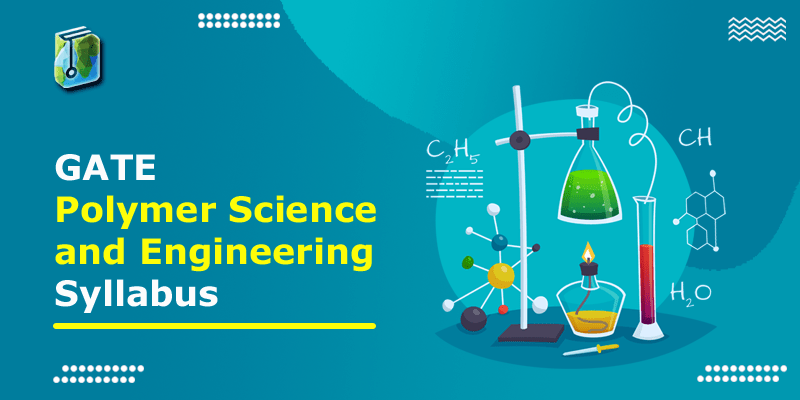Polymer Science and Engineering is a subdomain of material science that is majorly concerned with synthetic polymers. It includes research in the field of Chemistry, Physics, and Engineering. This article will give you complete information regarding GATE Polymer Science and Engineering Syllabus 2024.
GATE Polymer Science and Engineering Syllabus (XE_F) 2024
GATE Polymer Science and Engineering Syllabus consists of eight sections: Chemistry of High Polymers, Polymer Characterization, Synthesis and Properties, Polymer Blends and Composites, Polymer Technology, Polymer Rheology, Polymer Processing, and Polymer Testing.
Section 1: Chemistry of High Polymers
Monomers, functionality, degree of polymerizations, classification of polymers, glass transition, melting transition, criteria for rubberiness, polymerization methods: addition and condensation; their kinetics, metallocene polymers and other newer techniques of polymerization, copolymerization, monomer reactivity ratios and its significance, kinetics, different copolymers, random, alternating, azeotropic copolymerization, block and graft copolymers, techniques for copolymerization bulk, solution, suspension, emulsion.
Section 2: Polymer Characterization
Solubility and swelling, concept of average molecular weight, determination of number average, weight average, viscosity average and Z-average molecular weights, polymer crystallinity, analysis of polymers using IR, XRD, thermal (DSC, DMTA, TGA), microscopic (optical and electronic) techniques.
Section 3: Synthesis and Properties
Commodity and general purpose thermoplastics: PE, PP, PS, PVC, Polyesters, Acrylic, PU polymers. Engineering Plastics: Nylon, PC, PBT, PSU, PPO, ABS, Fluoropolymers Thermosetting polymers: PF, MF, UF, Epoxy, Unsaturated polyester, Alkyds. Natural and synthetic rubbers: Recovery of NR hydrocarbon from latex, SBR, Nitrile, CR, CSM, EPDM, IIR, BR, Silicone, TPE.
Section 4: Polymer Blends and Composites
Difference between blends and composites, their significance, choice of polymers for blending, blend miscibility-miscible and immiscible blends, thermodynamics, phase morphology, polymer alloys, polymer eutectics, plastic-plastic, rubber-plastic and rubber-rubber blends, FRP, particulate, long and short fiber-reinforced composites.
Section 5: Polymer Technology
Polymer compounding-need and significance, different compounding ingredients for rubber and plastics, crosslinking and vulcanization, vulcanization kinetics.
Section 6: Polymer Rheology
The flow of Newtonian and non-Newtonian fluids, different flow equations, dependence of shear modulus on temperature, molecular/segmental deformations at different zones and transitions. Measurements of rheological parameters by capillary rotating, parallel plate, cone-plate rheometer. Viscoelasticity-creep and stress relaxations, mechanical models, control of rheological characteristics through compounding, rubber curing in parallel plate viscometer, ODR and MDR.
Section 7: Polymer Processing
Compression moulding, transfer moulding, injection moulding, blow moulding, reaction injection moulding, extrusion, pultrusion, calendaring, rotational moulding, thermoforming, rubber processing in the two-roll mill, internal mixer.
Section 8: Polymer Testing
Mechanical-static and dynamic tensile, flexural, compressive, abrasion, endurance, fatigue, hardness, tear, resilience, impact, toughness. Conductivity-thermal and electrical, dielectric constant, dissipation factor, power factor, electric resistance, surface resistivity, volume resistivity, swelling, ageing resistance, environmental stress and cracking resistance.
Conclusion
Being a branch of material science, you will see complex numerical and topics. You must prepare diligently to score good marks to crack GATE 2024. Maintain an efficient timetable based on the GATE Polymer Science and Engineering syllabus 2024 and follow it diligently. Stick to a routine and do not procrastinate.
Today’s hard work will result in tomorrow’s success.
Best wishes!!!
People are also reading:
- GATE Syllabus
- GATE Syllabus 2024 (EE, CSE, ME, CE)
- GATE Architecture and Planning Syllabus
- GATE Textile Engineering and Fiber Science Syllabus
- GATE Biotechnology Syllabus
- GATE Exam Pattern
- GATE Metallurgical Engineering Syllabus
- GATE Electronics and Communications Engineering Syllabus
- GATE Thermodynamics Syllabus


can you provide topic wise mark distribution?